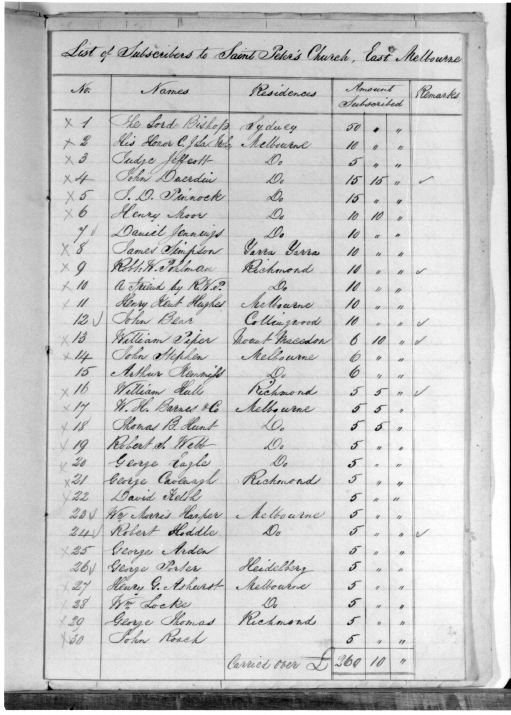
In the period before the completion of the first stage of the building – which was formally opened in August 1848, though it was in actual use during 1847 – the names of subscribers to the building fund are only partially indicative of the pool from which regular worshippers would be drawn. It includes the names of the first trustees, J. D. Pinnock (1810-75), Robert Pohlman (1811-77) and James Simpson (1792?-1857), the first two being distinguished public servants and members of the Legislative Council, while Simpson was a police magistrate and landowner. But many names appear on this list that do not feature regularly (or at all) among the names of pew renters in subsequent years. Conspicuous at the head with the largest single donation is William Grant Broughton – then Bishop of Australia, but with the consecration of bishops for Melbourne, Adelaide and Newcastle, his title became Bishop of Sydney. Another subscriber, Charles La Trobe – then the superintendent of the Port Phillip district, soon to become Lieutenant-Governor of the separate colony of Victoria – took a personal interest in the building, as well as being a regular worshipper. Correspondence shows that he hoped that the building would be entirely of stone, a hope that was not to be realized, since the first stage of building took place when the colony was emerging from a period of economic depression. Judge Jefcott's name, directly below La Trobe's, is a reminder that in the first decade of the church's existence, members of the legal profession formed the largest single professional group, but were quickly eclipsed for the rest of the century by the doctors and surgeons who set up their homes and rooms in nearby Collins Street. Pastoralists and landowners are represented by names such as those of John Bear, the father of another vestryman, parishioner, landowner and state politician – John Pinney Bear (1823-89). And the name of Henry Kent Hughes, who appears briefly as an early pew renter, foreshadows the involvement of the Hughes family of the next generation through the incumbency of Ernest Selwyn Hughes.